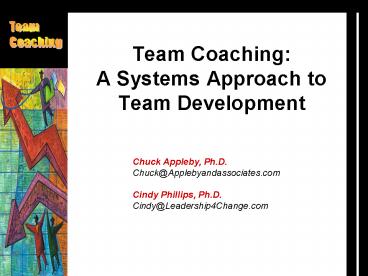Team Coaching: A Systems Approach to Team Development - PowerPoint PPT Presentation
1 / 21
Title:
Team Coaching: A Systems Approach to Team Development
Description:
What concerns you about the overall effectiveness of 'team ... Richard Hackman. Ruth Wageman. Mike Marquardt. Victoria Marsick. Robert Quinn. Barry Oshry ... – PowerPoint PPT presentation
Number of Views:1529
Avg rating:3.0/5.0
Title: Team Coaching: A Systems Approach to Team Development
1
Team Coaching A Systems Approach to Team
Development
Chuck Appleby, Ph.D.Chuck_at_Applebyandassociates.co
m Cindy Phillips, Ph.D. Cindy_at_Leadership4Change.c
om
2
Whats Your Experience?
- LEADERSHIP TEAM DEVELOPMENT
- What outcomes would you like to see more of in
your team interventions? - What concerns you about the overall effectiveness
of team building or coaching initiatives?
3
Defining Team Coaching
- An individual and team development process that
uses an integrated combination of interventions
to improve collaborative leadership skills, and
team performance.
Chuck Cindy
4
Why Were Here
- As organizations continue to struggle to find
time to dedicate to team development - Team coaching is emerging as a way to
accelerate team cohesion and effectiveness.
5
What Well Cover
- Some theoretical underpinnings
- Working model for team coaching
- Tools that support the process
- Insights from 2 case studies of team coaching
- Whats still missing?
6
Team Coaching The Theorists
- Jon Katzenbach
- Alexander Cahet
- David Clutterbuck
- Marshall Goldsmith
- Patrick Lencioni
- Richard Hackman
- Ruth Wageman
- Mike Marquardt
- Victoria Marsick
- Robert Quinn
- Barry Oshry
- Others??
7
Insights from the Team Coaching Literature
- Interventions that focus on task/process are more
effective than those that focus on
member/interpersonal relations. - Improvement is best when done in real time -
working on important issues. - Initiatives are best in combination with
consulting and facilitation. - Learning and action should be integrated.
8
The Systems Approach
The Domains
The Roles
The Levels
9
Team Coaching Model
- Discovery Interviews (Starting Point)
- Assessments (Pre- and Post Program)
- Individual and/or Team
- Kickoff Closing Sessions (Senior commitment to
engagement and action) - Sessions
- Competence segments Gems
- Focus on Individual issues
- Focus on Organizational/Team challenge
- Group size 6 to 8
- Frequency 1 to 2 times/month
- Duration 3 to 6 months
- Individual Coaching (Between sessions)
- Exchange with Direct Reports
- Peer Coaching (Between sessions)
10
Systemic Approach to Team Coaching
11
Primary Tools
- Assessments
- 360s, Lencioni, Inventory of Work Attitudes and
Motivation (IWAM) - Organizational climate survey
- Action Learning
- Focuses on improving questioning and reflection
- Proven to be a quick trust builder and
demonstrates how we move too quickly to solution - AL coach key component
- Peer Coaching
- Keep focus between sessions
- Accountability developed with peers
- Facilitates some longer-term relationships
- Room for confidential issues
12
Team CoachingClient Range
- Noblis (formerly Mitretek)
- Department of Energy
- Booz Allen Hamilton
- Sparks Personnel
- Washington Group International
- ENSCO
- Maryland Transit Administration
- Arlington County Government
- Emerging Leader Institute (DC Children and Youth
Investment Trust) - Cosmetic Executive Women
- Childrens Hospital
These are clients where we have used all or
part of our model.
13
Case Study 1 - Non-Profit
- 15 employees
- Intact Team President, COO, CFO, Functional
Directors - Presenting issues Tension between CEO/COO
lacking overall team cohesiveness and trust
clear vision - How Made it part of monthly staff meeting
various offsites to support it - Success Built team trust, surfaced process
issues, clarified priorities
14
Case Study 2 Management Consulting Co.
- Single Department - 75 employees
- Cross Functional Teams Middle to Senior
Management - Presenting Issues Low employee morale, high
turnover, lack of development and succession
planning - How Comprehensive Team Coaching program used for
Leadership Development - Success Turnover is trending downward, momentum
to continue (follow-through in working groups)
15
Quinn Sustainable Change Model
- Sustainable Change Requires
- Changing WHAT we do
- Changing HOW WE WORK TOGETHER
- Changing INDIVIDUALLY
- Quinn, Robert (1996) , Deep Change, Discovering
the Leader Within, San Francisco, Jossey-Bass
16
Current Measures of Success
- Creation of long-term peer coaching relationships
increased trust - Sense of shared/common issues
- Highlighted key leadership skills
- Vehicle for culture change
- Time spent on real/pressing issues
- See immediate behavior changes
- Reinforcing system of interventions
17
Why this Approach?
- Aligns with 21st Century Leadership Model
- Facilitates Paradigm Shift in Problem Solving
(focus on problem vs. solution) - Enables Peer Coaching Relationships to Develop
- Learning occurs in community and through
action!
18
What it Takes?
- 21st Century OD Consultant
- Comfort with Senior level interface
- Integrated design skills
- Project management skills
- Coaching (1-1, action learning)
- Facilitation (group, off-sites)
- Consultant (strategy, process improvement)
- Instructor/Educator (teaching segments)
19
Challenges
- Participant
- Opening up sharing challenges
- Too much peer sympathy wont push back too
hard - Organization/Client
- Keeping focus on Systems vs. Individuals
- Impact Measurement/ROI
- OD Consultant
- Requires a multi-discipline OD practioner
- Skill set tested on all levels
20
Whats Still Missing?
- How else could we measure progress?
- How do we balance individual, team and system
intervention needs? - How do we keep the momentum when we leave?
- How/where else could this be used?
21
Team Coaching A Systems Approach to Team
Development
Chuck Appleby, Ph.D.chuck_at_applebyandassociates.co
m Cindy Phillips, Ph.D. Cindy_at_Leadership4Change.c
om

